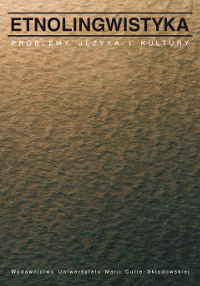Rozumienie narodu i jego profilowanie we współczesnym języku polskim
Nation and its profiling in contemporary Polish
Author(s): Monika BednarczukSubject(s): Anthropology, Language studies, Language and Literature Studies, Cognitive linguistics, Philology
Published by: Wydawnictwo Naukowe Uniwersytetu Marii Curie-Sklodowskiej
Keywords: cognitive definition; profiling; values; public discourse; nation
Summary/Abstract: The author attempts to describe the understanding of the concept of nation in contemporary Polish and construct its cognitive definition on the basis of the methodological principles proposed by Anna Wierzbicka and Jerzy Bartmiński. The analysis comprises systemic data, results of questionnaires, and diverse contemporary journalistic and other texts.The first part of the article contains an introduction to the conception of the cognitive definition and to the specific nature of Polish, culture-oriented and history-laden understanding of a nation. The second part presents, diachronically and synchronically, the functioning of the concept on the basis of lexicographic data, as well as its colloquial understanding by the speakers of Polish, on the basis the questionnaires.Next, a discussion is offered of the contemporary image of a nation in press and of the reactions to the abuse of the concept in certain political spheres. The base elements in the understanding of nation are: (1) a common territory; (2) a common history; (3) a common culture, collective consciousness, language, perhaps religion (Catholicism); (4) common political and economic interests. However, the position of individual elements in the structure of the concept is not stable, e.g. the questions of a common territory and language are sometimes treated loosely, especially by the younger generation (easier and more common migration). The final part is devoted to the problem of the profiling of the concept in various types of public discourse (leftwing, national and rightwing, Catholic (typical of the Catholic Church), liberaldemocratic, feminist, anarchist and neopagan), together with the ideological tradition on which these discourses are built.
Journal: Etnolingwistyka. Problemy Języka I Kultury
- Issue Year: 21/2009
- Issue No: 21
- Page Range: 85-101
- Page Count: 17
- Language: Polish

